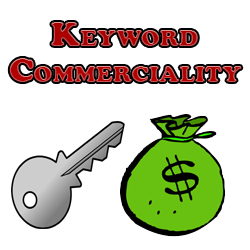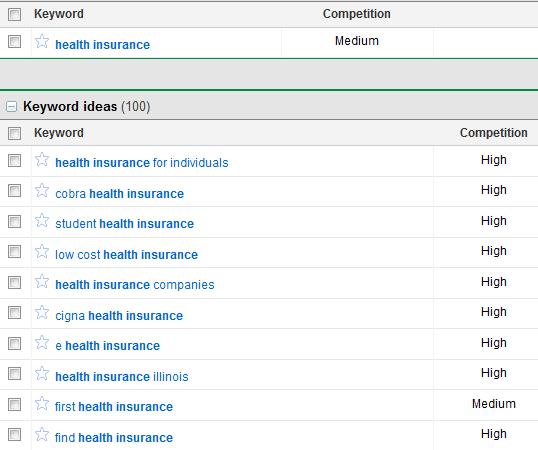One of the four keys (see what is a good keyword) to finding a great keyword is commerciality. Keyword commerciality isn’t just a measure of how much money you can make on a particular keyword but more a gauge of how likely are the people who are using that search term to find your site versus other keywords to spend money or take action on whatever offers you’re promoting.
Keyword Commerciality
Low keyword commerciality simply suggests that the people who are using that particular keyword aren’t looking to spend any money. Again though it’s not just about spending money, it’s about taking the kind of action you want that visitor to your site to take. This can be signing up for your mailing list or generating any other number of leads.
If you’re getting a lot of traffic from a particular keyword but that traffic isn’t converting even though it’s highly relevant to your site, you can assume that that keyword has low commerciality and isn’t worth your time to try to rank for it.
That’s why you should never overlook the importance of the final key in keyword research that is keyword commerciality. Even if you find a relevant keyword which has high search volume and low competition, there isn’t much of a point to targeting it if it won’t convert.
The problem with gauging keyword commerciality is that you can’t really gauge how commercial a particular search phrase is until you’ve generated a decent enough amount of traffic.
Luckily we can do this extremely quickly (like with so many other things) by using paid advertising like Adwords.
1 – Look at the Competition Levels
On a very surface level, we can use tools to gauge the competition levels for those words in Adwords. Note that I don’t mean organic competition, I’m exclusively referring to its competition amongst Adwords bidders. With this method we’re letting other webmasters/advertisers do the heavy lifting for us and considering what they consider to be a valuable and commercial keyword.
Note this diagram I copied from a quick Google Keyword Tool search which shows nondescript levels of competition “low, medium, and high”.
 Now compare it with this diagram I copied from my own Market Samurai search for the same keywords.
Now compare it with this diagram I copied from my own Market Samurai search for the same keywords.
I love Market Samurai because of the far more detailed information which you can get from it such as how many clicks you can expect to get from your add based on search volume for that keyword, of course how competitive that keyword is on Adwords vs. every other keyword (the best clear cut indicator of competition), and even things like a rough estimate of how much you can expect to pay to bid on that keyword. This gives you a lot more information to consider in addition to simply would a keyword be considered commercial.
Additionally, I tend to trust it over Google’s data in their keyword tool Remember the keyword module can be downloaded FOR FREE, so check it out if you get a chance.
2 – Do Your Own Research
To get an even better idea we can spend some money at do some of our own research. We simply bid on that keyword and track the traffic which is exclusively coming from those ads to our site and track those visitors’ actions once they reach our site. I’ll talk more about this in an upcoming post on Google Analytics, so check back for that. If not enough of a percentage of that traffic is converting on your goals, you know that that phrase has little commerciality.
In this way, paid advertising can be the most authentic and accurate real life way to decide which keywords to target organically, as well. If you know that a keyword is incredibly commercial but has a little more competition than you’d normally consider when doing your keyword research, you might hunker down and work extra hard to vie for that phrase knowing how valuable it would be for you.
